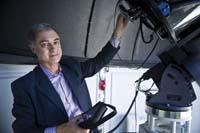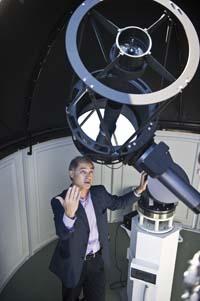"One of the great challenges of exploring the Solar System is to find life"

We have been lucky and have worked hard. You have to have a little intuition to choose topics that are supposedly pointers and of great interest. There are atmospheres in other planets and in those atmospheres there are processes similar to those that occur on Earth, in short they are natural laboratories in which we can explore the climate change, the hole of the ozone layer, the formation and duration of anticyclones and depressions, the gigantic storms -- which has appeared on the surfaces of Nature and Science...We can not do this type of laboratory in a more natural laboratory.
I think everyone. Each atmosphere has its peculiarities that we can see on Earth. For example, Venus has a huge greenhouse effect, its atmosphere is filled with carbon dioxide: Learning the greenhouse effect of Venus we will better understand ours.
On Mars we study the same processes as on Earth -- depressions, anticyclones…- but with the advantage that we do not have oceans, the surface is totally solid. So it is easier to make prediction and we can improve ours.
In Jupiter and Saturn we have gigantic storms and cyclones that last centuries and do not dissolve (the anticyclone of the Azores has a maximum duration of one month).
It is very difficult to predict such atmospheric phenomena, and we can learn a lot from these planets with different chemical compositions, temperature, speed of translation, size, etc. It is like changing the parameters in the computer, but when you want to perform tests in the laboratory you cannot build a Jupiter or the atmosphere of Venus. We have it there, in space, and that's why we're here.

I think we are in an unbeatable time. Evidently, the economic crisis has slowed down some projects, but in general, some space missions are exploring the entire solar system. And we cannot deny that finding life is one of the great challenges we have in the exploration of the Solar System. Finding life beyond the Earth would drastically change biology, medicine... We do not know where we would arrive if, for example, tomorrow on Mars they found an organism in which DNA has been replaced by another complex molecule. Even if you had DNA. Have you come from the earth? Is it a different replica that has evolved as on Earth in another environment? Any answer to these questions is really surprising. Therefore, today it is really fascinating to find life on Mars, on the satellites of Jupiter (Europe and Ganymedes, where there are believed to be subsurface oceans) or on Titan (in the cold hydrocarbon-rich satellite of Saturn).
It is logical to think that in the universe there is intelligent life somewhere, because in the universe there are about one hundred billion galaxies. And each galaxy has a hundred billion stars. If we think that many of these stars have planets – and surely it is so, because they are discovering many extrasolar planets – and if life has been created on many of these planets, perhaps life has begun a path to intelligence. But these are only probabilities. It must be known that the conditions necessary to create and evolve life are not so easy: specific conditions are necessary in terms of the type of star, type of planet, environment, etc.
There are at least three fundamental components: water, the best solvent for any chemical compound; carbon, basic element capable of forming gigantic organic molecules; and then there is a fundamental element that has taught us a lot: energy. Until recently we thought that the only energy available to live came from a star. Today we know that underwater life does not use solar energy, but low geothermal energy. And this is very important for seeking an extreme life. Of course, it will be another type of life, probably very primitive. But it will be important and, for example, it can be found in satellites like Europe or Ganymedes, which have subsurface oceans.
Indeed. That can be a response to Fermi's paradox, which says: "If they are there, why haven't they visited us? ". The existence of other intelligent beings may be due to the great distance between them and us. Another answer could be more serious, that we are really alone in the universe.

We human beings do not know how to value our position in the cosmos: we live in a wonderful world. If we look toward the sun, to Venus, we have beside us a calcined world, with a greenhouse effect that reaches temperatures of 450 C that melt lead; if we look outward, to Mars, we have a totally frozen planet, almost without atmosphere. We live in a very appropriate place, in a good place. Let's take care of this world. Humility is also necessary; when we see billions of galaxies, billions of stars in the universe, we realize that we are a speck of lost dust in the universe, and that our miseries make no sense.
One of the great challenges is to have a technology that allows us to travel faster through the Solar System. We are taking the first steps around our planet, but we will leave it. I think we have unique challenges. It is difficult to explore space: Outside the Earth, outside our niche of life, conditions are extreme, but I think in the coming years -- if the economic system allows us -- we will know much better the worlds that surround us and we will be able to exploit their resources; as they end up on Earth we will be able to remove them from other worlds. And we will certainly advance on other worlds. Our civilization and culture is 6,000 years old and looks at what we have advanced.
I think yes, of course. We have to leave our planet and move towards other planets. I am sure it will be so.
Buletina
Bidali zure helbide elektronikoa eta jaso asteroko buletina zure sarrera-ontzian











